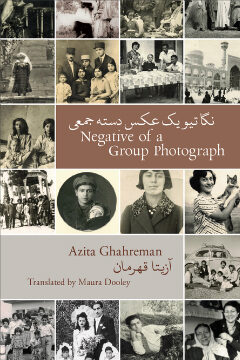Glaucoma
Notes
Notes on the literal translation:
This poem is quite a good introduction to Azita's work - personal in a slightly cryptic and understated way, and with a melancholy political undertone. It references Azita's childhood growing up in Khorasan and well as her own family's political history.
*The title translates literally as ‘black water' and when I spoke to her about it, this is how she wanted it to be translated. In Iranian, ‘black water' is also the term used for glaucoma, a condition where you lose your eyesight. So there is an underlying reference to gradual blindness. Azita had first said that we should translate the title as ‘Black Water' but after reflection she told me that ‘Glaucoma' might convey meaning better - so now she's leaving it up to you which one matches the overall feeling better.
[1] Corn poppies are the flowers that mark the beginning of spring. They are also the flowers (alongside the more traditional tulip flower, often red) that symbolise political prisoners
[2] Could also be grasshoppers - in context, this refers to the locust migrations in the south, desert climate areas of Iran. Locust migration is an unusual phenomenon where swarms of locusts migrate and destroy everything in their passage. It's a strange phenomenon, one that many Khorasani writers and poets have referenced, and the metaphor of an overwhelming, sudden, overtaking, and even destructive event comes to mind when they are referenced.
[3] Each one of these elements symbolise a different season, and so perhaps an overall reference to passing time
[4] Thorns, or razor? Perhaps razor as the Persian word is not from the natural world.
[5] This word is usually used for mountain ranges, so quite a visual image of the mountain range of mosques
[6] Referring to the royal roots of Azita's family
[7] Implication of them now being damp rooms - fallen on harder times
[8] Oppenheimer, the physicist who first invented nuclear weapons; Patrice Lumumba, the Congolese independence leader in the 60s - the specific reference to these people is in relation to what they represented for the world, but their inclusion is reflective of the political undertones within the poet's own family
[9]‘Elias' in the Persian text was traditionally a place where the second hand clothes and objects of deceased people were sold, and the closest thing Iranians had to second hand shops - these no longer exist. After discussion with Azita, we decided that the best translation for this would be something closer to second hand shop, rather than a ‘sale shop' as it translates literally
[10] Literally in Persian the word used is squared, or four-framed, the small triangle headscarves that women wear are squares of material
[11] The idea that a lot of different people co-exist
[12] This refers to the images of Qajar princes that could be seen on cups, teapots, and the base of shisha pipes, as can be seen in the image attached. The tradition of putting the king or prince's images on such items was a way of developing the kingly presence through objects, particularly through stately gifts abroad. In translation, I'm not sure that the shisha or water pipe image can speak to a British audience without becoming a stereotypical image of ‘the orient'; Azita suggested using a comparable image, like that of British stately figures on china etc., perhaps this is something we can talk about to get the balance between translation and meaning right?
[13] Not necessarily an image that she is being ignored, simply that she is praying in that way, perhaps praying in front of the poet?
[14] In Persian this word is often not written in the Persian text, and it is implied that the brother is member of something: on the website the word for this is missing, but Azita told me that the missing word is ‘bassij'. When discussing this with Azita she said that this reference pointed out that members of a single family could believe different things, but they were still family.
Elhum Shakerifar, Literal Translator


